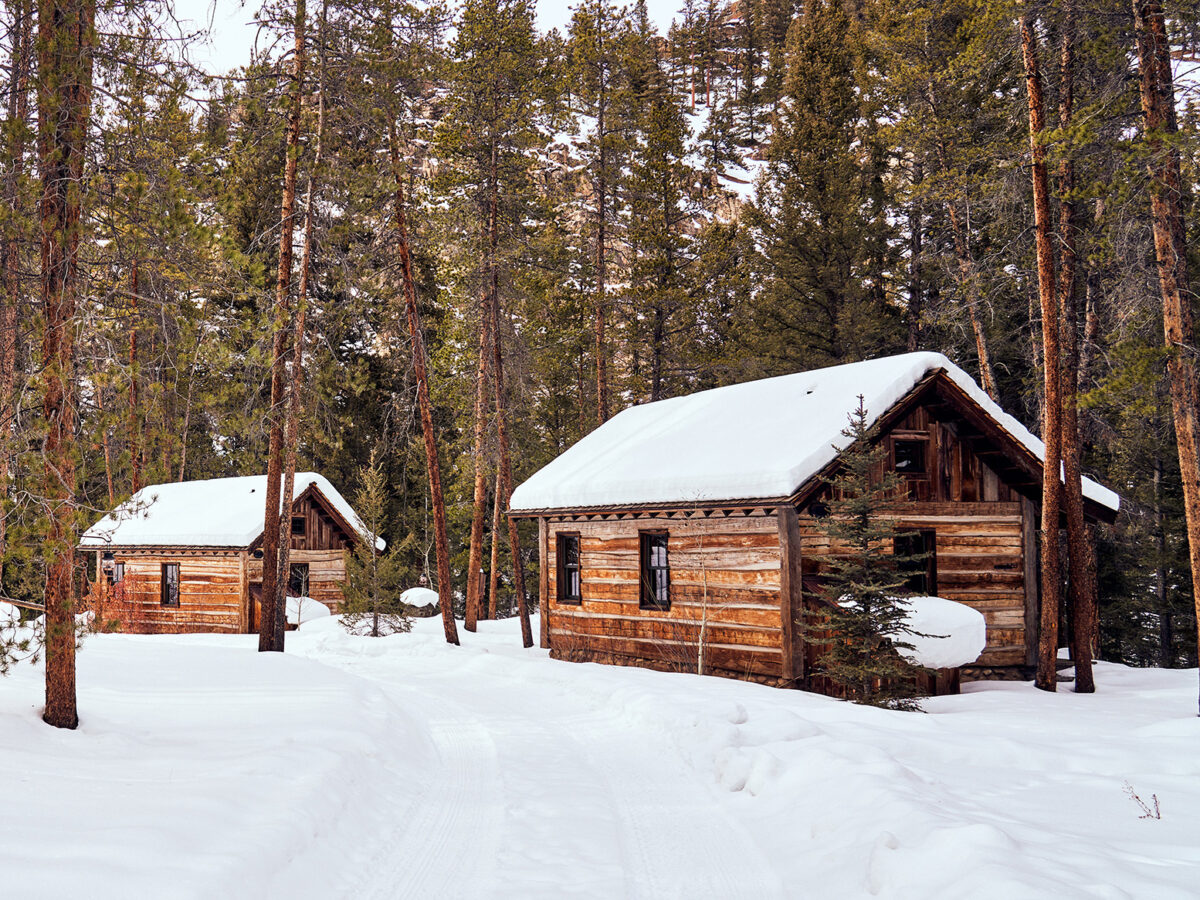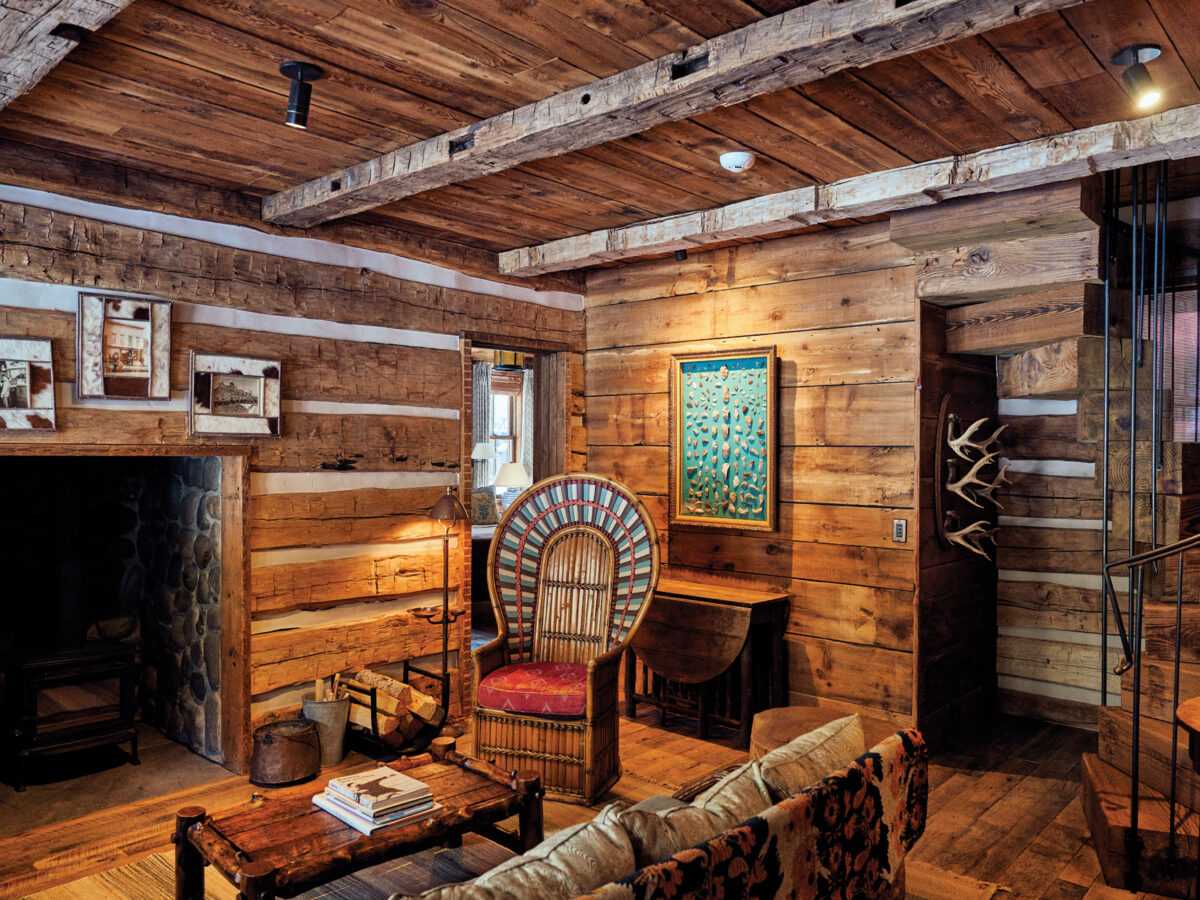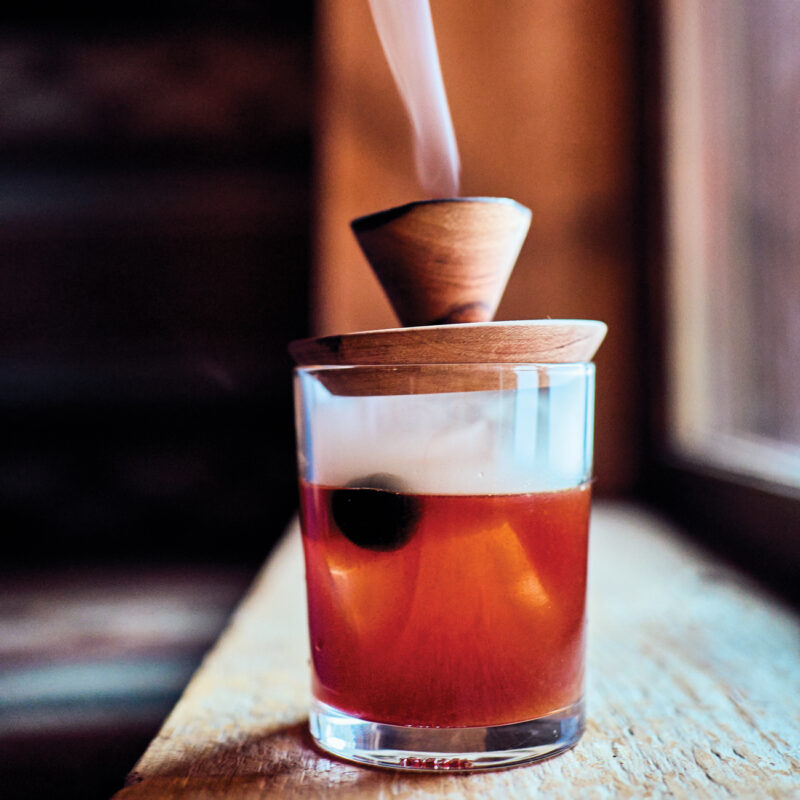
How I Found Peace This Winter on a Cold-Plunging, Snow-Shoeing, Forest-Bathing Adventure
Taylor River Lodge offers winter activities that allow guests to connect with the cold in new, meaningful ways, no resort pass required.

Thomas J. Story
The thin alpine air stings my lungs as I vigorously inhale and exhale in kapalabhati pranayama, or breath of fire, hoping to warm my body while focusing on the ice-cold rushing water beyond the frozen banks of the Taylor River. I reluctantly remove my robe and slowly submerge myself in the frigid stream, simultaneously questioning my sanity and attempting to regulate the rush of self-doubt. As a competitive swimmer who spent her career lamenting morning workouts during the winter, I’d have splashed water in your face if you told me I’d be willingly plunging into a frozen river in the name of wellness. But there I am, meditating for three full minutes as the frigid water rushes around me, repeating to myself, “We can do hard things.”

Thomas J. Story
My guide today is Caith Norton, wellness program manager at Eleven, an experience-based hotel group headquartered in Crested Butte, Colorado. When I’m at my limit, Norton calls it, and I pull my numb body out of the frigid water and run back to the steaming indoor jacuzzi at the lodge, wade in, and feel the biggest rush of my life. As extreme cold meets extreme hot, I’m bathed in an intense sense of clarity and a full-body high that no drug could ever provide. And I can’t wait to do it again.

Thomas J. Story
This serenity in the snow is new for me. When I was growing up in sunny Southern California, with parents who were both public school educators, skiing wasn’t really something we did. Even in the 1980s, it was an elite sport that required expensive gear, resort passes, and a four-wheel-drive vehicle that could get up to the mountain in the first place. We spent most of our time outdoors at the beach, where I felt as perfectly at home as a little mermaid. In college, I’d hang back while my friends jaunted off to Tahoe, knowing they’d regale me with tales of the shred when they returned to the dining hall. And now, dating in my late thirties, I find that the arrival of winter means everyone’s online profiles start to boast which resort passes they have as a signal of compatibility. All by way of saying, snow always felt exclusive. I didn’t belong, and it wasn’t for me. (Besides, I’d made it this far without any major injuries that come along with the snow sports, so why bother learning now?)

Thomas J. Story
Then, a couple years back, I discovered snowshoeing, and everything changed. I loved how meditative and slow the sport was—like hiking, with pow. Not only is it a way to be present with the stunning surroundings, but it’s also an incredible workout. I loved how being forced to slow down simply by sheer mechanics allowed me to really drink in my surroundings. It was the exact opposite of barreling down a mountain. And being out alone with nature required no fancy gear or expensive lift ticket, just some snowshoes, a pair of Sorels, poles, and a good trail map.
So when I heard that Eleven was hosting a wellness retreat that focused on what I like to call “slow snow” activities—Nordic skiing, snowshoeing, meditating, cold plunges, and forest bathing—I was immediately intrigued.

The cozy log cabins at Eleven’s Taylor River Lodge provide the perfect base for a one-of-a- kind winter wellness retreat.
Thomas J. Story
Eleven operates place-based luxury adventure lodges in destinations around the globe known for their natural beauty, like Iceland, Patagonia, and the French Alps. At Taylor River Lodge, a remote retreat outside the stunning mountain town of Crested Butte (where they’re based), Eleven offers an array of what can only be described as profound, soul-shifting journeys that integrate the cold, no Ikon Pass required.
Taylor River Lodge is comprised of eight beautifully appointed log cabins, and the trips truly integrate the greatest parts of the surroundings. Norton, who has a background in kinesiology, launched the annual retreat with the intention of getting guests to slow down and be present in the environment.

Thomas J. Story
“I wanted to create a retreat that was a unique blend of wellness-based adventure, that incorporated small hacks throughout that could be subtly woven into a guest’s life back home,” says Norton. “These retreats are based in connection to environment, each other, and ultimately the self.”
To get a sense of the surrounding terrain, we head deep into the Gunnison National Forest for Taylor River’s version of forest bathing. In Japan, this process is called shinrin-roku, and requires that you fully engage all of your senses to be present in the wilderness. I’ve admittedly done this form of meditation many times while leaf peeping or hiking in the warmer months, but the idea of slowing down in the snow seems foreign.

Thomas J. Story
“These retreats are designed to use the cocooning effect of the winter months to drive people inward. The dark, snowy, slow, quiet days of winter help foster time spent alone, nurturing and taking care of yourself, instead of being so driven and directed by outside influences,” says Norton. “The most profound and universal result is a sense of acceptance of what is. Instead of trying to change the weather, the temperature, their environment, we simply accept and embrace the current circumstances.”
Our guide Bel Young, a wilderness first responder and American Institute for Avalanche Research and Education expert, leads us through the sparkling sugar snow stands of the Fossil Ridge Wilderness, where she and Norton highlight everything from snow profiles to using our five senses to experience the terrain, including tasting the needles of the towering ponderosa pines, used by the Ute tribe as medicinal tea. Toward the end of our hike, Norton leads us in sonic meditation, where we zero in on singular sounds in the forest—a sonic drishti, if you will—to home in on individual sounds in the space: the gentle gurgling of a stream, the musical trill of a snowbird, wind rustling through the pines.

Thomas J. Story
We make our way back to the lodge, where we’re greeted by an oversize blazing fireplace, an après snow spread of local cheeses, handmade jams, and charcuterie, and one heck of a cedar-smoked Old Fashioned. (The winter wellness retreat offers zero-proof cocktail classes for those exploring the damp lifestyle as well.) For dinner, we indulge in trout from the nearby river before retreating to our cabins underneath a sky carpeted with stars.

Thomas J. Story
This penchant for place-based experiences is reflected in everything from the food to the spa, where therapists use heated stones collected from the river in their massage treatments.
And while you are indeed challenged both mentally and physically, there is a sense of restorative healing taking place too, from the deep sleep you’ll get after a guided meditation sinking into marshmallow fluff bedding to a pre-flight yoga session before your return home. And if you’re like me, you’ll be going back with the ultimate souvenir—a deeper appreciation for even the most challenging of life’s seasons.
